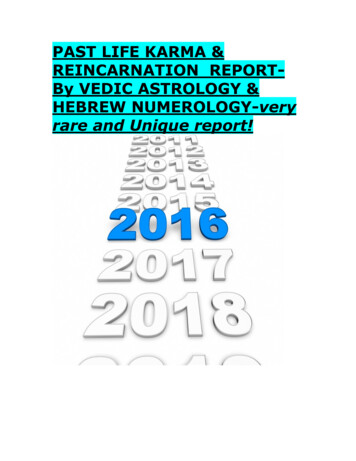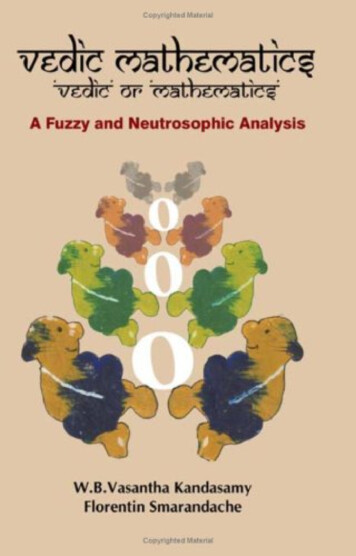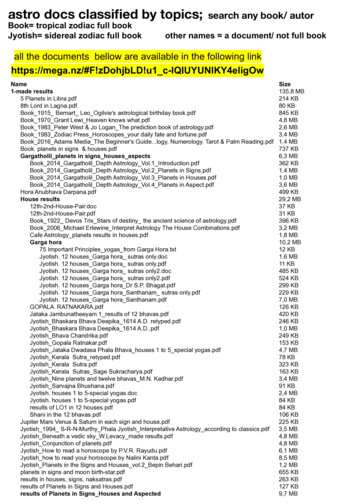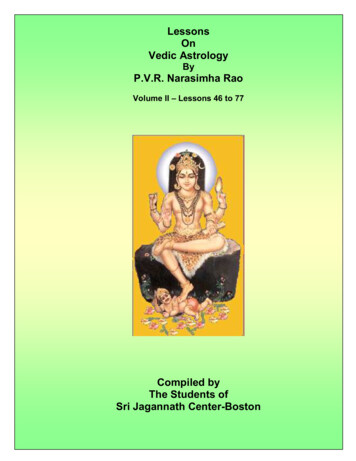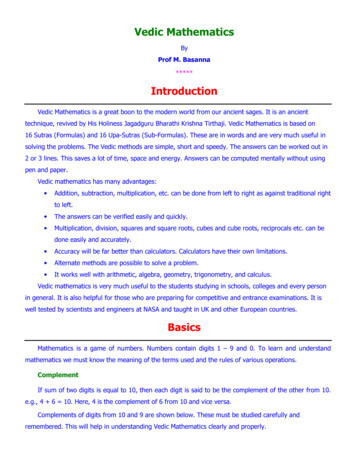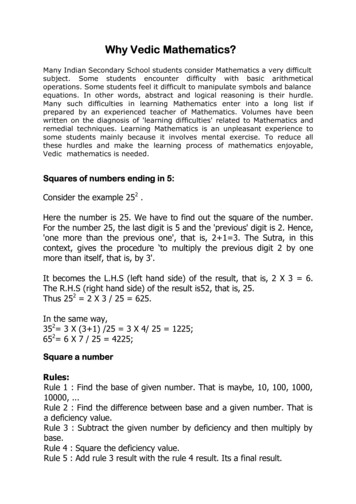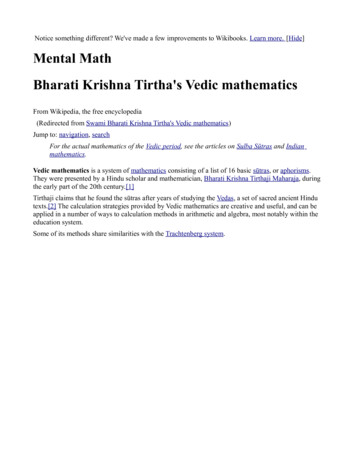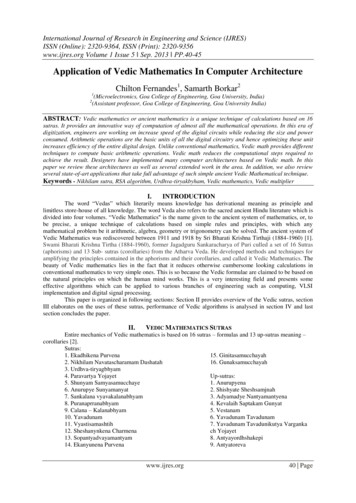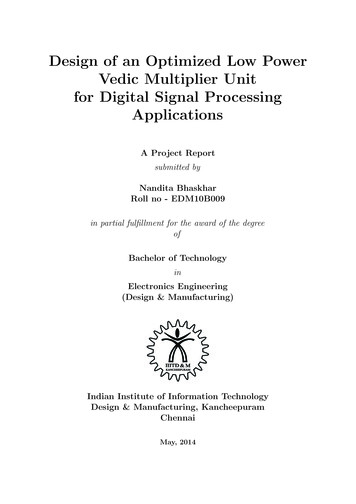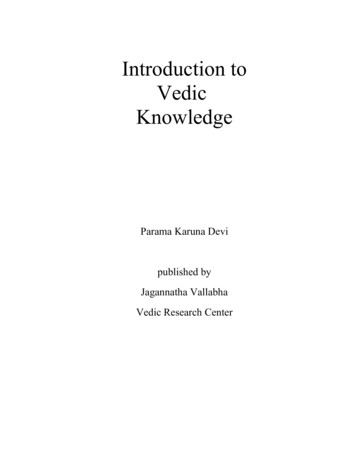
Transcription
Introduction toVedicKnowledgeParama Karuna Devipublished byJagannatha VallabhaVedic Research Center
Copyright 2012 Parama Karuna DeviAll rights reserved.Title ID: 4165735ISBN-13: 978-1482500363ISBN-10: 148250036:Jagannatha Vallabha Vedic Research Center 91 94373 00906E-mail: paramakaruna@aol.inWebsite: r 2011 PAVANPAVAN HouseSiddha Mahavira patana,Puri 752002 Orissa
Introduction to Vedic KnowledgeTABLE OF CONTENTS1. Perspectives of studyThe perception of Vedic culture in western historyStudy of vedic scriptures in Indian history2. The Vedic textsWhen, how and by whom the Vedas were writtenThe four original Vedas - Samhitas, Brahmanas, AranyakasUpanishads3. The fifth Veda: the epic poemsMahabharata and Bhagavad gitaRamayana and Yoga VasisthaPuranas4. The secondary VedasVedangas and UpavedasVedanta sutraAgamas and TantraConclusion3
Parama Karuna Devi4
Introduction to Vedic KnowledgeThe perception of Vedic culturein western historyThis publication originates from the need to present in a simple, clear, objective andexhaustive way, the basic information about the original Vedic knowledge, that in thecourse of the centuries has often been confused by colonialist propaganda, through thewritings of indologists belonging to the euro-centric Christian academic system (thatwere bent on refuting and demolishing the vedic scriptures rather than presenting them ina positive way) and through the cultural superimposition suffered by sincere students whoonly had access to very indirect material, already carefully chosen and filtered byprofessors or commentators that were afflicted by negative prejudice.It was pope Onorius IV (1286-1287) to inaugurate in the West the study of orientallanguages and precisely Hebrew, Greek and Arabic. He had studied at the University ofParis before entering the diplomatic career at the service of pope Clement IV (12651268), who sent him to celebrate the crowning of Charles d'Anjou as King of Sicily.After becoming pope, Onorius introduced in the University of Paris the new curriculum(Studia linguarum) aimed at building the languistic knowledge required to understand theoriginal texts of the Old and New Testament and the coranic texts, that were thetheological, ethical and philosophical foundations of the scholars which in those timeswere not subject to the Church of Rome: Jews, orthodox Christians and Muslims.The Ecumenic Council of Wien (1311-1312) recognized the importance of Onorius'strategy and encouraged the creation of suitable departments in all the other Europeanuniversities, that were then under the complete control of the Church of Rome. In fact, allthe universities started as Scholae monasticae approved by the papal bull Studiageneralia, and were managed by the cathedrals or monasteries and aimed at trainingpriests, government officers, lawyers and pyhysicians that would remain strictly loyal to5
Parama Karuna Devithe Church of Rome. All the students received the clerical tonsure and were onlysubjected to the ecclesiastic legal authority and not to the authority of the King or anyother government agency.The passage from Schola monastica to University (universitas magistrorum etscholarium, "universal community of teachers and scholars") was specificallycharacterized by the creation of teachers' guilds that acquired a certain organizationalautonomy from the parishes on which they initially depended. The first of suchuniversities was recognized in Bologna in 1088, followed by those of Paris in 1150,Oxford (1167), Valencia (1208), Cambridge (1209), Salamanca (1218), Montpellier(1220) and Padova (1222).The official language of all universities was Latin, even if the students - coming from allparts of Europe - were divided into "nationes". At the University of Paris these wereFrance, Normandie, Picardie and England-Germany, which also included the studentsfrom Scandinavia and eastern Europe.After attending the preliminary courses (trivium: Latin grammar, rhetoric and dialectics,and quadrivium: arithmetics, geometry, music and astronomy) the students proceeded tofurther degrees of specialization, importance and glory consisting in the studies of arts,natural philosophy, medicine, canonic law and theology.That period saw the resurfacing of some ancient texts that had somehow escaped the antipagan devastation conducted by Christians during the previous millennium. However, theonly "approved" author allowed to be studied was Aristotle, and his writings wereadapted to support the Christian theology, as we can see in the famous SummaTheologica by Thomas Aquinas. There were also strict limitations on Aristotle's books:his prohibited texts included physics and metaphysics.The arabic texts studied in that period were on mathematics, geometry, medicine and thecommentaries on the fragments of Aristotle; the most famous authors were Avicenna eAverroè.Avicenna (Abū ‘Alī al-Ḥusayn ibn ‘Abd Allāh ibn Sīnā, 980-1037 CE), considered thefather of modern medicine and "avicennan logic", perhaps the greatest representative ofthe so-called "golden age of Islam". He wrote The Book of Healing and the Canon of6
Introduction to Vedic KnowledgeMedicine, based on the teachings of Sushruta samhita and Charaka samhita as well asthe writings of Hyppocrates and Galen. He also explored Indian mathematics andaristotelic and neoplatonic philosophy.Averroè (Abū l-Walīd Muhammad ibn Ahmad Muhammad ibn Rushd, 1126-1198), qadiof Sevilla and Cordoba like his father and grandfather, became famous for his logicalrefutations in defense of the philosophical search, that he presented as compatible andnon-contrary to theology. Specifically, he wrote many famous translations withcommentaries to the texts of Aristotle, that had become completely forgotten in the West.His most important work, The Destruction of Destruction (Tahāfut al-tahāfut, in LatinDestructio destructionis) is a refutation of The Destruction of the Philosophers (Tahāfutal-falāsifa, in Latin Destructio philosophorum), the aggressive text in which Al Ghazalipresented freedom of thinking as offensive against Islamic theology. Averroè alsocomposed a voluminous text focused on the analysis of the Islamic religious doctrines ofhis times and a treatise on General Medicine. Because of his defense of the intrinsic valueof culture and free thinking, Averroè was pronounced as heretic, exiled and kept understrict control until his death: this sentence is considered the turning point closing the briefperiod of the "golden age" of Islamic domination.Aristotle's works were translated from Greek into Latin also by the monks of SaintMichel, including Giacomo Veneto, starting from 1127. However, the study of Aristotle'sphilosophy was merely aimed at creating Church leaders that were adequately equippedwith the knowledge required to protect it and bring about its triumph at global level.Among the laureates from the University of Paris there were many popes, such asCelestine II, Adrian IV, Innocentius III and Onorius IV.In his attempts at becoming independent from the Church of Rome, Henry VIII ofEngland too established chairs of "Regius Professor" to teach Hebrew at Cambridge in1540 and at Oxford in 1546; then a department of Arabic was established in Cambridgein 1643. In 1669 Edmund Castell published his "Dictionary of seven language", theLexicon Heptaglotton Hebraicum, Chaldaicum, Syriacum, Samaritanum, Aethiopicum,Arabicum, et Persicum.Of course, all the knowledge offered in the universities had to be subordinated to theChristian doctrine: only in the 19th century, after the French revolution and Napoleon's7
Parama Karuna Deviregime, theology ceased to be a compulsory study in the universities - first in Paris andthen in Oxford.Indology proper (as the study of Sanskrit and Vedic texts) only started after a new searoute to the Indies became feasible. During the period of Islamic expansion, commercewith India was strictly controlled and exploited by Muslims, therefore the Europeankingdoms suffered great economic losses due to the extreme rise in the cost of spices. Atthat time, spices were used as medicines, flavorings and preservatives for food, as well asingredients for perfumes and scents for body, clothing and houses. We need to rememberthat in that period there was no refrigeration system, the Christian rules discouragedpeople from taking baths and toilets were seriously rudimentary.The crusades failed in their attempt to take the Middle East away from Islam, and southEurope had to engage in a hard war on its very territory - Spain, south Italy, Greece - tofight back the invasions of the "Sarrasins". Only in 1491 the King of Spain was able toretake Grenada from the hands of the Muslims. When Constantinople fell in the hands ofthe Turks, the European monarchs started to seek urgently for a sea route that could allowthem to reach the Indies without having to travel through the territories occupied byIslam. This was precisely the plan of Christopher Columbus, as when he started hisjourney in 1492 he was not looking for America but rather for India, It was also the planof Vasco da Gama (journey from 1497 to 1499), Magellan (journey of 1519-1522) andother great navigators of those times. The explicit ambition of those monarchs was thedirect conquest of the territories and their resources, to be exploited for the greater powerof Christianity, so each expedition was accompanied by an ambassador of the Church ofRome, who was to report everything to the pope.Francis (Francisco) Xavier de Jasso y Azpilicueta (1506-1552) had graduated from ParisUniversity together with Ignatius Loyola and Pierre Favre. He left in 1549 to accompanythe Portuguese expedition of Vasco da Gama and organize India's christianization.Initially Xavier had founded the Jesuit order together with Ignatius of Loyola and other 5friends, with the declared purpose of "converting all the Muslims of the Middle East", butas that task had proven impossible, the Company of Jesus shifted its attention to thefabulous Indies. The Portuguese expedition landed at Goa, on the west coast of India,taking possession of the territory in the name of the pope and immediately founding theCollege of Saint Paul, a seminar to train lay priests, that was entrusted to by Michele8
Introduction to Vedic KnowledgeRuggieri. This became the headquarters of the Jesuits in Asia, the base from whichNobili, Ricci and Beschi started for their missions respectively to India and to the FarEast.In India, Roberto de Nobili (1577-1656) developed the method of inculturation(accommodatio), that had already been successfully applied in Europe in the earlycenturies of Christianity (for example with the Christmas tree, Easter eggs, theprocessions of the saints, etc) adopting and adapting those Indian traditions and customsthat could make Christianity "more digestible" for the natives. He dressed as a sannyasi,with a shaved head and sikha, and utilized terms in Sanskrit and Tamil - for examplecalling "Veda" the Bible and "Guru" the Christian priest. He also explained thebrahmanas' sacred thread as a symbol of Christian Trinity and so on.All over the occupied region Xavier destroyed the temples, the sacred places and thereligious scriptures, that he openly denounced as "works of the devil, repellent andgrotesque", applying the usual brutal ways to force the native population to convert toChristianity. All the brahmanas were killed or expelled together with their books, and thepopulation was forced to regularly gather in churches to listen to the preaching againsttheir own religion. All the texts that were not written in Portuguese language wereburned, no matter what their subject was.Xavier was particularly interested in children and he removed them from their families"to educate them in a Christian way". Still today in India we find innumerable schoolsand especially institutes of higher studies - colleges and universities - dedicated to thename of Francis Xavier, and still today it is normal among Hindus to call "idols" thesacred images of their own religion and "mythology" the sacred stories contained inUpanishads, Puranas and Itihasas - so much that people have difficulties inunderstanding why such definitions are incorrect and inadequate to refer to the objects oftheir own faith.In his diaries, Xavier wrote about the children educated by the Jesuits: "Their hatred foridolatry is wonderful. They revolt against the heathens and when they see their ownparents engaging in pagan practices, they scold them and come at once to me to report.As soon as I know about one such situation, I go to the spot with a band of these children,who immediately shower the devil with an amount of insult and damage greater than9
Parama Karuna Deviwhat was the amount of honor and worship it had received from parents, relatives andfriends. The children jump on the idols, they throw them down, break them to pieces, spiton them, trample them under their feet and kick them around - in short, they do them allpossible offense. I order to destroy the huts where the idols were kept, and to shatter theidols into the smallest pieces possible. I would never end to describe the great consolationthat fills my soul when I see this destruction of the idols by the hands of the idolatersthemselves. I cannot describe the happiness I feel watching the idols cast down anddestroyed by those same people that once used to worship them. If in spite of all goodadvice someone persists in making idols, we have him punished by the chief of thevillage, who sentences him to exile, and we burn his house as a warning for the others."Besides tirelessly carrying on with this kind of preaching, Xavier repeatedly asked boththe pope and the King of Portugal to introduce the Inquisition in India (where itcontinued in full swing until 1812) to uproot all traces of paganism as well as heresy andeven punish scarce enthusiasm in the Christian faith. The local Penal Code of theInquisition filled 320 pages with the list of prohibitions, and the punishments for therebels were considered by all contemporaries as the heaviest ever applied by thePortuguese catholic Church. Still today the region of Goa is strongly Catholic, and theremnants of Francis Xavier's body are worshiped as a relic in the main basilica.The two great maritime and colonial powers in those times were Portugal and Spain, towhich pope Martin V assigned the entire world as legal possession with the bulla RexRegnum, giving them "right of crusade and conquest" on all the territories they wouldfind, each on either side of the famous "Tordesillas line" that divided the planet into twohalves. The Portugal was given Africa and Asia, while Spain was assigned the newterritories of the Americas.The kingdoms of Britain, France and Holland, that were politically non-aligned with thepope and therefore "not authorized" to conquer lands outside Europe, organized first theirpirate fleets to grab whatever they could of the immense wealth transported home by theSpanish and Portuguese fleets. Soon they realized that it was much easier and convenientto establish their own colonies in the New World dealing directly with the natives, whodid not seem to care much for the authority of the pope in Rome or Christianity ingeneral.10
Introduction to Vedic KnowledgeAfter the battle of Gravelines (1588) and the famous defeat of the Spanish InvincibleArmada that was trying to invade the English coasts, and the two subsequent Spanishfailures of 1596 and 1597, England became the greatest maritime and colonial power ofthe times, under the enlightened reign of Elizabeth I. Already in 1600 the Queen createdthe East India Trading Company with the status of English Royal Charter. The Companypractically had the European monopoly of trade on tea, cotton, silk, indigo and opium,with a strong competitor in the Dutch equivalent of East India Trading Company, thatwas dealing mostly with spices, cocoa, coffee, sugar etc.In the subsequent centuries England founded colonies of migrants in north America andAustralia, and established a strong commercial and political control on India. In 1670king Charles II gave the Company the right to acquire territories independently, to mintcurrency, hold forts and command army troops, establish alliances, wage war and signpeace treaties, exercing full civil and criminal jurisdiction on the territories it acquired.The British regime in India had started.William Carey (1761-1834), founder of the Baptist Missionary Society, published in1792 the volume An Enquiry into the Obligations of Christians to use means for theConversion of the Heathens. To further his mission, he started to study oriental languagesand with the help of one Pandit Mrityunjay he compiled a series of dictionaries of thelocal languages. From his Serampore Mission press, near Calcutta, he printed over 200thousands Bibles in 45 Indian and oriental languages (including Oriya, Hindi, Tamil,Sikh, Parsi, Sindhi, Nepali, Armenian, Afghan, Gujarati, Bhutani, Javanese, Siamese andSinhalese) and started to train a group of "Christian pundits" who studied the Vedicscriptures to refute and oppose them. He also started the publication of school texts forthe Fort William College and for the Calcutta School Book Society, as well as the firstmonthly magazine and then the first daily newspaper in Bengali, starting from 1818. Hisorganization also produced the paper for the printing.Charles Grant (1746-1823), president of the East India Company, was an ardent activistof the Evangelic party led by William Wilberforce (1759-1833). Under his protectionClaudius Bucchanan arrived in 1790 at Calcutta; Bucchanan was convinced that God haddelivered India into the hands of the British for the only purpose of christianizing theHindus, liberating them from "the yoke of the dark and degrading, monstrous and absurdsuperstitions of their native faith." After becoming vice president of the Serampore11
Parama Karuna DeviCollege, Bucchanan journeyed to Orissa in 1805 briging back deeply distorteddescriptions of the "Moloch Jaggernauth" to whom - according to him - thousands ofhuman sacrifices were offered during the annual Ratha yatra at Puri, the "Mecca orJerusalem of the Hindoos, the Sebastopol of their idolatry".In 1797 Charles Grant wrote a libel entitled Observations on the State among the AsiaticSubjects of Great Britain, particularly with respect to morals and means of improvingthem, in which he clearly expressed his intention to introduce to India a strictly Christianschool system aimed at demolishing Vedic culture. His Evangelist fellow A.H. Bowmanwrote, "Hinduism is a great philosophy which lives on unchanged whilst other systemsare dead, which as yet un supplanted has its stronghold in Vedanta, the last and the mostsubtle and powerful foe of Christianity." This hostile approach was obviously inspiredand supported by the university academics, still heavily under the control of Christianity specifically, in Britan it was Anglican Protestantism, in which the monarch (now emperorof the colonies) was the highest religious authority.Horace Hayman Wilson (1786-1860), graduated in Medicine at the St Thomas Hospital,arrived in India as assistant surgeon with the East India Company and became secretary(from 1811 to 1833) and then director (from 1837 to 1860) of the Royal Asiatic Societyof Bengal. He translated the Meghaduta by Kalidasa and the Vishnu Purana, then in1819 he published the first English-Sanskrit dictionary and helped Mill to compile hisfamous historical treatise. He was the first to obtain the post of Professor for the BodenChair of Sanskrit at Oxford in 1833 and he immediately announced a prize of 200sterling pounds for "the best refutation of the Hindu religious system".After him, the Boden Chair went to Sir Monier-Williams (1819-1899, author of the mostfamous and still popularly used Sanskrit/English dictionary), who wrote, "For whatpurpose then has this enormous territory been committed to England? Not to be the'corpus vile' of political, social, or military experiments; not for benefit of our commerce,or the increase of our wealth - but that every man, woman and child, from Cape Comorinto the Himalaya mountains, may be elevated, enlightened Christianized. When the wallsof the mighty fortress of Brahmanism are encircled, undermined, and finally stormed bythe solders of the cross, the victory of Christianity must be signal and complete."12
Introduction to Vedic KnowledgeContrarily to what had been done by the Portuguese government in Goa, where thecatholic Inquisition had been imposed by force, the British colonial government strictlymaintained a neutral facade, that was necessary in order to avoid the indignation and theviolent rebellion of 50 million Indians against the 30 thousand Britishers staying in India.The documents of that period show that sometimes this motivation was also openlydeclared, as for example by Mr. Twinings, pioneer of the tea trade, and by ColonelMontgomery, commander in chief of the British army in India. Under the governatorateof Lord Cornwallis (1786-1805) the official position of the colonial government was to"preserve the laws of the Shaster and the Koran, and to protect the natives of India in thefree exercise of their religion," but the missionaries were not only tolerated but evenactively helped, because this was convenient for the colonial purposes. The British primeminister, Lord Palmerston (Henry John Temple, 3rd viscount of Palmerston, in officefrom 1807 until his death in 1865) declared, "It is not only our duty, but in our owninterest to promote the diffusion of Christianity as far as possible throughout the lengthand breadth of India".Secretary of State Lord Halifax (1881-1959), too, was of the same opinion: " Everyadditional Christian is an additional bond of union with this country and an additionalsource of strength to the Empire."It is interesting to notice that Lord Halifax, also known as Edward Frederick LindleyWood, first Earl of Halifax, remained in charge as Secretary for Foreign Affairs from1938 to 1940, and was appointed Viceroy of India from 1926 to 1931 with the additionaltitle of Baron of Irwin on direct recommendation of King George V, also becauseEdward's grandfather had been Secretary of State for India. In that position, and under thedirect pressure of the British King, Lord Halifax took a series of disastrous decisions withthe aim of severely repressing the Indian independence movement.Thomas Babbington Macaulay (1800-1859), first Legislator Lord under the GeneralGovernor of India, was given the task to organize the academic system in India preciselyin this direction. In a 1836 letter to his father, Macaulay wrote, "It is my belief that if ourplans of education are followed up, there will not be a single idolator among therespectable classes in Bengal thirty years hence. No Hindu who has received an Englisheducation ever remains sincerely attached to his religion."13
Parama Karuna DeviThe missionary Alexander Duff (1806-1878) founded in Calcutta the famous ScottishChurches College, which he envisioned as a "headquarters for a great campaign againstHinduism." He trained students from the wealthy classes of Indian society and possiblyfrom the "high castes" to learn the language and ideals of the colonial government, thusshaping the impressionable minds of the youngsters into the firm belief in the superiorityof Christianity and European civilization, for the purpose of creating an intermediateclass of "brown sahibs" that would control the native masses for them. The culturalbattle against Hinduism was well beyond the scope of the British colonial government:the christianization of the entire world was presented as "the white man's burden" - theduty and mission of each European.Amongs the many others, Baron von Bunsen, ambassador of Prussia in England, dreamedabout converting the entire world to Christianity. His protegé Fredrich Max Mueller(1823-1900), born in Dessau (Germany), studied Sanskrit at Leipzig and translated theHitopadesa before arriving in England in 1846. He was introduced to Macauley andobtained from the East India Company the task to translate the Rig Veda into English - 4shillings a page. After settling in Oxford, Max Mueller translated many other texts andwrote the encyclopedia The Sacred Books of the East (50 volumes, started in 1875). Hewrote, "This edition of mine and the translation of the Veda will hereafter tell to a greatextent. the fate of India, and on the growth of millions of souls in that country. theonly way of uprooting all that has sprung from it during the last 3000 years. and that isof a more degraded and savage character than the worship of Jupiter, Apollo orMinerva. It may have but served to prepare the way of Christ. India is much riper forChristianity than Rome or Greece were at the time of Saint Paul."Max Muller was particularly irked by those scholars who, instead of devotingthemselves to this "evangelic mission", committed the mortal sin to sincerely appreciateVedic knowledge: one who did that "should know that he can expect no money; nay, heshould himself wish for no mercy, but invite the heaviest artillery. to condoneBrahminical idolatry and to discountenance Christianity is to commit high treasonagainst humanity and civilization."One of such rebels was Louis Jacolliot (1837-1890), a French scholar that for a periodbecame supreme Judge in the court of Chandranagar for the colonial regime. In his bookThe Bible in India, Jacolliot wrote, "O Land of ancient India! O Cradle of Humanity,14
Introduction to Vedic Knowledgehail! Hail revered motherland whom centuries of brutal invasions have not yet buriedunder the dust of oblivion. Hail, Fatherland of faith, of love, of poetry and of science.May we hail a revival of thy past in our Western future. How glorious the epoch thatthen presented itself to my study and comprehension! . I enquired of monuments andruins, I questioned the Vedas whose pages count their existence by thousands of yearsand whence enquiring youth imbibed the science of life long before Thebes of thehundred gates or Babylon the great had traced their foundations. And then Indiaappears to me in all the living power of her originality – I traced her progress in theexpansion of her enlightenment over the world – I saw her giving her laws, her customs,her morale, her religion to Egypt, to Persia, to Greece and Rome. Name of us anymodern discovery, and we venture to say that Indian history need not long be searchedbefore the prototype will be found on record. we may read what Manu said, perhaps10,000 years before the birth of Christ: The first germ of life was developed by waterand heat. Water ascends towards the sky in vapors; from the sun it descends in rain, fromthe rains are born the plants, and from the plants, animals. . India of the Vedasentertained a respect for women amounting to worship; a fact which we seem little tosuspect in Europe when we accuse the extreme East of having denied the dignity ofwoman, and of having only made her an instrument of pleasure and of passiveobedience."Even the officers of the British government were often very impressed by Vedic culture.In 1689, John Ovington (the King's chaplain) wrote A Voyage to Surat, where he said,"Of all the regions of the Earth (India is) the only Public theatre of Justice andTenderness to Brutes and all living creatures." He also found that, because of their(vegetarian) diet, the Hindus kept "a comely and proportionate body and lived a long life.The simple and meatless food made their thoughts quick and nimble, theircomprehension of things easier and developed in them a spirit of fearlessness."In 1690 the diplomat Sir William Temple wrote in his Essay upon the Ancient andModern Learning, "it seems most probable that Pythagoras learned, and transported intoGreece and Italy, the greatest part of his natural and moral philosophy, rather than fromthe Aegyptians. Nor does it seem unlikely that the Aegyptians themselves might havedrawn much of their learning from the Indians long before."Lord Warren Hastings (1732-1818), first governor general of India (from 1773 to 1785),15
Parama Karuna Deviwrote, "The writers of the Indian philosophies will survive, when the British dominion inIndia shall long have ceased to exist, and when the sources which it yielded of wealth andpower are lost to remembrances."Sir Thomas Munro (1761-1827), officer of the British government and governor ofMadras (in 1819) stated to the House of Commons, "If a good system of agriculture,unrivalled manufacturing skill, a capacity to produce whatever can contribute toconvenience or luxury, schools established in every village for teaching, reading, writingand arithmetic; the general practice of hospitality and charity among each other; andabove all, a treatment of the female sex full of confidence, respect, and delicacy, (if allthese) are among the signs which denote a civilized people, then the Hindus, are notinferior to the nations of Europe; and if civilization is to become an article of tradebetween England and India, I am convinced that England will gain by the import cargo."Colonel James Tod (1782-1835) wrote in his Annals and Antiquities of Rajasthan: or theCentral and Western Rajput States of India: "sages like those whose systems ofphilosophy were prototypes of those of Greece: to whose works Plato, Thales &Pythagoras were disciples? Where do I find astronomers whose knowledge of planetarysystems yet excites wonder in Europe as well as the architects and sculptors whose worksclaim our admiration, and the musicians who could make the mind oscillate from joy tosorrow, from tears to smile."In 1887 Sir William Wedderburn Bart (1838 - 1918), magistr
Introduction to Vedic Knowledge The perception of Vedic culture in western history This publication originates from the need to present in a simple, clear, objective and exhaustive way, the basic information about the original Vedic knowledge, that in the course of the centuries has often been confused by colonialist propaganda, through the
